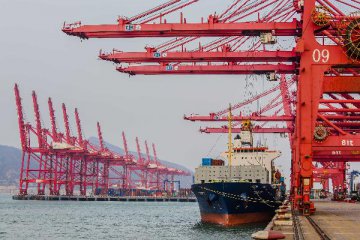
As the trade war between Washington and Beijing ramps up, analysts are divided over just how tariffs will impact China's economy.
Some economists say the tariff battle between the world's two largest economies — which advanced with a new round of tit-for-tat taxes on Monday — could land a significant hit on the East Asian giant, while others contend that China will manage around the White House's offensive.
That argument may, however, miss the point about the future of the communist country.
American and Chinese officials have made headlines in recent months for their confident predictions of trade war victory, but many longtime China watchers say the most important drivers and trends affecting Asia's largest economy go well beyond tariffs.
Slowing investment, mounting debt
China has long relied on infrastructure investments to drive its economic growth.
Investments contributed to 44 percent of China's nominal GDP in December 2017, compared to about 20 to 25 percent for countries like the United States, Japan and Germany, according to figures compiled by economic data provider CEIC.
China's fixed asset investment is slowing, however, with investment growth falling to a record low in August. Economists including Nicholas Lardy from the Peterson Institute for International Economics, however, warn against paying too much attention to the historically low figure as China is currently revising the way it measures fixed asset investment.
Still, as the trade war escalates, it will not be easy for the Chinese government to use public spending to boost investments due to its mounting debt.
The world's second-largest economy had a relatively stable level of debt until the financial crisis in 2008 when it spent a whopping 12.5 percent of its GDP to stimulate the economy.
The country had encouraged loans to boost economic growth, with Chinese banks extending a record 12.65 trillion yuan ($1.88 trillion) in loans in 2016. That credit explosion stoked worries about financial risks, so authorities in 2017 pledged to contain the rapid build up in debt.
Since then, Chinese debt-to-GDP has steadily grown to about 250 percent — or about $28 trillion, according to DBS and CEIC.
However, the Institute of International Finance has put China's debt at more than 300 percent of its GDP.
The International Monetary Fund issued a strong warning about the country's economy in 2017, warning that debt-fueled growth is an unsustainable long-term solution.
Chinese authorities had been trying to rein in the country's rising debt, with China's state-owned banks told in April to stop lending to local governments. But as the trade war drags on, China appears to be using investments to boost the economy again.
The National Development and Reform Commission, a top Chinese economic regulator, announced earlier this month that it aimed to promote infrastructure investment.
Aging population, betting on consumption
While China is trying to improve productivity through automation and robotics, the effects of its aging population are taking a toll on the economy.
"Demographic trends could subtract 0.5 to 1 percentage point from annual GDP growth over the next three decades in post-dividend countries such as China and Japan," the IMF said in a 2017 report.
China's one-child policy ended in 2016. Couples are now limited to two children, but there has been speculation that officials are mulling scrapping birth restrictions altogether.
But decades of limiting couples to having only a single child have led to plunging birthrates. That, along with a corresponding aging population and shrinking labor force, has implications for the country's consumption trends.
China has been trying to move toward economic growth that's led by consumers, but data on consumption has been mixed. Monthly retail sales have been slowing, but quarterly spending, which includes education and travel, is on the rise.
China's online retail giants, meanwhile, reflect a nuanced picture of consumption. In the second quarter of 2018, Alibaba saw sales rise by more than 60 percent from last year, even though rival JD.com faced slower sales.
Source: CNBC




















Latest comments